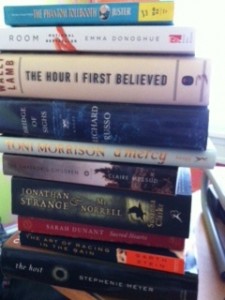If you are a long-term reader of Spin Sucks, you know I’m a big fan of reading fiction to help your storytelling and content development.
(If you’re new here, welcome…and I believe reading fiction makes you a better storyteller!)
Now there is a new study that proves my fandom more than just a passing idea.
A study by a pair of social psychologists at the New School and one by researchers in the Netherlands went to Mechanical Turk on Amazon and asked people to participate in their research.
They divided the groups into three and gave them each a few passages to read.
Then they did an “eye test” and asked them to review groups of eyes to determine what the people were feeling behind their irises.
What they found was the people who read literary fiction (Don DeLillo, Wendell Berry) were more empathetic in describing the eyes than those who read commercial fiction (Gillian Flynn, Rosamunde Pilcher, or Robert Heinlein) or non-fiction (Smithsonian magazine).
Literary Fiction Equals More Empathy
They discovered literary fiction versus commercial fiction was more results-producing when it comes to empathy because, with the former, you read about the complex lives or a person (or people) and put yourself in their shoes throughout the story.
With commercial fiction, the characters are more closely aligned with our own struggles, issues, or challenges so it’s less likely to help us build empathy, rather solidify our feelings.
The New York Times explored this a bit and talked to the researchers.
In popular fiction, David Comer Kidd, a doctoral candidate and one of the researchers, said “really the author is in control, and the reader has a more passive role.”
In literary fiction, like Dostoyevsky, “there is no single, overarching authorial voice,” he said. “Each character presents a different version of reality, and they aren’t necessarily reliable. You have to participate as a reader in this dialectic, which is really something you have to do in real life.”
It’s not to say popular fiction or non-fiction should be excluded.
Fiction Makes You a Better Storyteller
On the contrary.
Fiction is an underused tool to become better at storytelling. If you produce content, reading fiction is not a nice-to-have; it’s a necessity.
You should read Wally Lamb and Ernest Hemingway or Mark Twain and Gillian Flynn and you should read blog posts and articles and listen to podcasts and you should read business books and you should watch and read the news. If you do all of that and read People, you will become a natural storyteller.
Naturally curious people read a lot, which makes them excellent storytellers.
To tell great company stories, you must read fiction.
Now you have the opportunity to “get away” with reading fiction. It helps your storytelling. It makes you a better content producer. And it enables you to see your organization’s stories in new and compelling ways.
So, the next time you want to sit down with a good book instead of watching The Biggest Loser, point your critics to this blog post.
